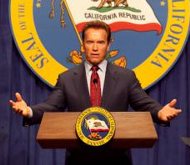1/9/2010
Schwarzenegger Pushes Speed Cameras In California BudgetCalifornia budget for 2010-11 proposes unleashing speed cameras to generate $338 million in revenue.

California Governor Arnold Schwarzenegger, desperately seeking new sources of revenue to cover a $19.9 billion budget shortfall, yesterday declared a state of fiscal emergency. As part of his proposed solution, Schwarzenegger called for the deployment of a massive statewide speed camera program to generate at least $397.5 million in net profit to state and local government.
Under the proposal, existing red light cameras at intersections would be converted into "speed on green" cameras that issue citations to motorists who try to speed up at an intersection to make the light. Those who slow down and fail to make the light will be mailed a red light camera ticket.
"Various federal rules are tying our hands and preventing us from reducing costs in some state programs," Schwarzenegger explained at a news conference yesterday. "I want to remind the federal judges and the politicians California is not Washington. We do not have the luxury of printing money or running trillion-dollar deficits."
Although it is not printing money, the existing network of over a thousand municipal automated ticketing machines are expected to print over two million citations each year. The corresponding revenue that would be split 85 percent for the state -- an estimated $337.9 million in the first year -- and 15 percent to municipalities -- $59.6 million. These figures do not include the millions that the well-connected private companies that operate the photo ticketing programs will collect.
California law currently prohibits the use of speed cameras, but in 2008 Caltrans laid the groundwork for the governor's program by researching technical aspects of deploying speed cameras on the state highway system. This is not the state's first experience with photo radar. Beginning in 1988, Pasadena began issuing speed camera citations to be followed over the course of a decade by the cities of Campbell, National City, Oakland, Riverside and Roseville. The experiments were far from successful. Courts undermined the effort by ruling that citations could not be enforced without proper service.
"The court will no longer process photo-radar speeding tickets where a ticket is merely mailed to the registered owner of a vehicle," Oakland Municipal Court Presiding Judge Stephen Dombrink said in January 1997.
As motorists learned that they could safely ignore tickets, they stopped paying in large numbers because the programs were as unpopular with the public as they were with the courts.
"We've been getting flipped off a lot," said Riverside Police Sergeant Jay Theuer explained to the Press-Enterprise newspaper on January 14, 1994. "It's been mostly a negative reaction."
As revenue dried up, cities one-by-one dropped automated ticketing -- with one exception. The legislature stepped in and banned speed cameras in 2000, but San Jose ignored this law and continued to allow a contractor to run a speed camera program until courts stepped in and began overturning citations in 2007.


